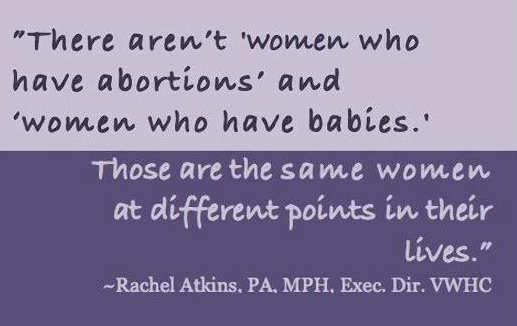Abortion Myths Dispelled
Abortion stigma leads to several myths and misconceptions. Two days ago, we received a newsletter from Abortion Review with this excellent piece on abortion myths! We woud like to share them with you.
Source: Abortion Review
Speaking at a London conference organised by BPAS and the Margaret Pyke Trust on 18 December, Ann Furedi, chief executive of BPAS, began by noting the absurdity of the law as it relates to early medical abortion procedures: if a woman comes to BPAS with a spontaneous miscarriage, she can go home with misoprostol in her handbag; yet if she comes for an induced abortion, she has to go home with it in her vagina’. She went on to discuss the following ‘five myths about abortion’:
* MYTH 1: WOMEN DON’T KNOW WHAT THEY WANT.
 In fact pregnant women are very like non-pregnant women, or men – ‘they know what they want and we need to be led by them’.
In fact pregnant women are very like non-pregnant women, or men – ‘they know what they want and we need to be led by them’.
This doesn’t mean, said Furedi, that no women are ambivalent – their decision about ending the pregnancy can be shaded, and they may make different decisions at different times in their lives, ‘but that doesn’t mean that the decision they make is not the right one for them now’.
Furedi also noted that ‘women’s state of mind has become a hugely contested area’, and challenged the way that discussions around abortion counselling this year have ‘caricatured women as being vulnerable just by needing an abortion’.
Some women do need more support, she said; but there is ‘nothing more unreasonable than assuming that a woman coming for an abortion cannot make her decision.’
* MYTH 2 – ABORTION NUMBERS JUST GO UP AND UP.
The number of abortions is not the problem – abortion can be a solution to an unwanted pregnancy. Furedi also pointed out that, in any case, numbers have been pretty stable for some years, which indicates that making abortion easily available does not simply lead to an inexorable rise.
* MYTH 3 – BETTER SEX EDUCATION COULD PREVENT THE NEED FOR ABORTION.
 Noting that this is a ‘hugely politically incorrect thing to say’, Furedi said that while she does think better sex education would be a good thing, she is not convinced that it would impact on abortion rates. First, ‘the young people we see in the clinics are not, by and large, sexually ignorant – they are pretty familiar with contraceptive methods, where to get them from and how to use them. There may be a huge amount that young people need to learn about sex and relationships but there’s a question about whether we can teach them about these things in a didactic way, in school’. Second, ‘the majority of unwanted pregnancies and abortions happen to people who are in their twenties’ – despite the prevailing idea that teenage pregnancy is a huge problem, the numbers are actually quite small.
Noting that this is a ‘hugely politically incorrect thing to say’, Furedi said that while she does think better sex education would be a good thing, she is not convinced that it would impact on abortion rates. First, ‘the young people we see in the clinics are not, by and large, sexually ignorant – they are pretty familiar with contraceptive methods, where to get them from and how to use them. There may be a huge amount that young people need to learn about sex and relationships but there’s a question about whether we can teach them about these things in a didactic way, in school’. Second, ‘the majority of unwanted pregnancies and abortions happen to people who are in their twenties’ – despite the prevailing idea that teenage pregnancy is a huge problem, the numbers are actually quite small.
* MYTH 4 – CONTRACEPTION CAN PREVENT THE NEED FOR ABORTION.
Better access and use can perhaps lower the rate of abortion, said Furedi, but it won’t make numbers plummet – for the simple reason that people fail to use contraception, and contraception also fails. Long-acting methods are likely to be the most effective, but ‘when we counsel people we know that the often don’t want to use them’. There is a ‘huge gap’, Furedi explained, between ‘what we think is perfect method of contraception and the young people sitting in front of us, who are often suspicious of medical professionals – and suspicious of adults in general – and don’t want to be dependent on the doctor saying, OK, I’ll take it out’.
* MYTH 5 – ONLY CERTAIN TYPES OF PEOPLE NEED ABORTION.

There is a persistent idea that the media helps promote, Furedi said, that ‘women who need abortions are either victims or sluts’ – they are unmarried, young, or women who haven’t sorted their contraception out. In reality, women who have abortions are ‘just like us’, and abortion is a service that is necessary for every woman.
Other sessions at the conference discussed post-abortion contraception and care in general practice, the GP’s role in pre-abortion counselling, and the safety and efficacy of contraception in obese women. Read a report here: http://www.abortionreview.org/index.php/site/article/1249/






